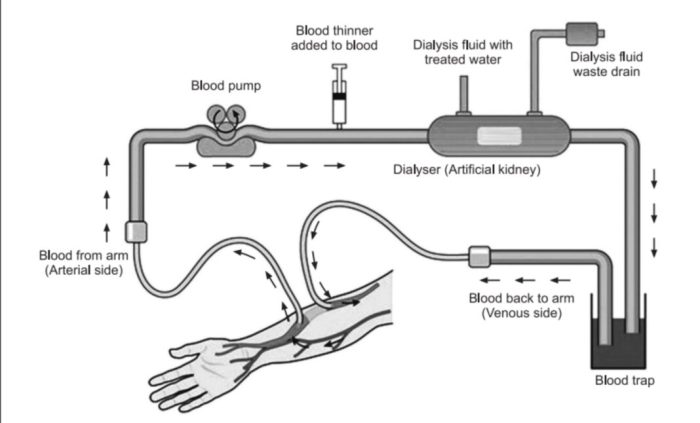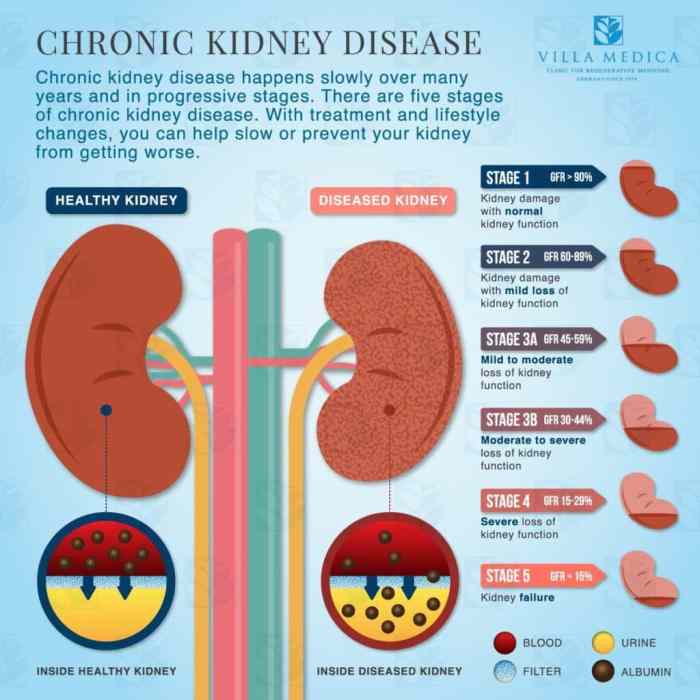Chronic renal failure hesi case study – Chronic renal failure, a complex and debilitating condition, demands a comprehensive understanding of its underlying mechanisms, clinical presentations, and therapeutic interventions. This case study delves into the intricate tapestry of chronic renal failure, offering a thorough examination of its etiology, pathophysiology, diagnostic criteria, and management strategies.
As we navigate the complexities of chronic renal failure, we will explore the interplay between its various etiologies, the cascade of physiological events leading to kidney dysfunction, and the spectrum of clinical manifestations that arise from impaired renal function. Furthermore, we will delve into the diagnostic armamentarium employed to identify and stage chronic renal failure, as well as the multifaceted treatment options available, ranging from conservative management to renal replacement therapies.
Chronic Renal Failure

Chronic renal failure (CRF) is a progressive decline in kidney function that occurs over months or years. It is characterized by the gradual loss of nephrons, the functional units of the kidneys responsible for filtering waste products and excess fluid from the blood.
CRF can lead to a buildup of toxins in the body, electrolyte imbalances, and ultimately, end-stage renal disease (ESRD), requiring dialysis or kidney transplantation.
Etiology and Pathophysiology

The underlying causes of CRF can be classified into two broad categories: prerenal and renal.
- Prerenal causesresult from conditions that impair blood flow to the kidneys, such as dehydration, shock, or severe heart failure.
- Renal causesdirectly damage the kidneys, including glomerulonephritis, pyelonephritis, diabetic nephropathy, and polycystic kidney disease.
The pathophysiology of CRF involves a complex interplay of factors that lead to progressive nephron loss and impaired kidney function. The initial insult to the kidneys triggers a cascade of events, including inflammation, fibrosis, and tubular atrophy. Over time, these changes result in a decline in the glomerular filtration rate (GFR), the measure of kidney function.
Risk factors for developing CRF include:
- Diabetes
- Hypertension
- Glomerulonephritis
- Polycystic kidney disease
- Advanced age
- Family history of CRF
Clinical Manifestations

The clinical manifestations of CRF vary depending on the stage of the disease. In the early stages, there may be no symptoms or only mild symptoms, such as:
- Fatigue
- Nausea
- Vomiting
- Loss of appetite
- Polyuria (increased urine output)
- Nocturia (frequent urination at night)
As CRF progresses, more severe symptoms may develop, including:
- Edema (swelling) in the legs, ankles, and feet
- Shortness of breath
- Chest pain
- High blood pressure
- Anemia
- Metabolic acidosis
- Hyperkalemia (high potassium levels)
- Hypocalcemia (low calcium levels)
CRF can also lead to complications such as heart disease, stroke, and infections.
The differential diagnosis for CRF includes other conditions that can cause similar symptoms, such as:
- Acute kidney injury
- Chronic pyelonephritis
- Polycystic kidney disease
- Lupus nephritis
- Multiple myeloma
Questions and Answers: Chronic Renal Failure Hesi Case Study
What are the common causes of chronic renal failure?
Chronic renal failure can result from a wide range of etiologies, including diabetes, hypertension, glomerulonephritis, polycystic kidney disease, and obstructive uropathy.
What are the key clinical manifestations of chronic renal failure?
Chronic renal failure can manifest with a variety of symptoms, including fatigue, nocturia, polyuria, edema, nausea, vomiting, and decreased appetite.
How is chronic renal failure diagnosed?
The diagnosis of chronic renal failure is based on a combination of clinical history, physical examination, and laboratory tests, including serum creatinine and estimated glomerular filtration rate (eGFR).
What are the treatment options for chronic renal failure?
Treatment options for chronic renal failure include conservative management, dialysis, and kidney transplantation.
What is the role of nurses in the care of patients with chronic renal failure?
Nurses play a vital role in the care of patients with chronic renal failure, providing patient education, symptom management, and support throughout the disease trajectory.